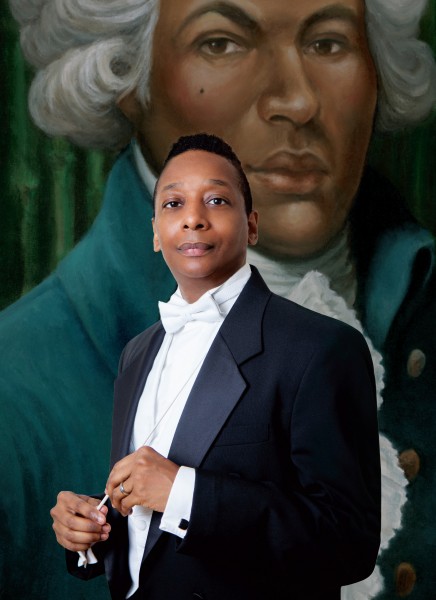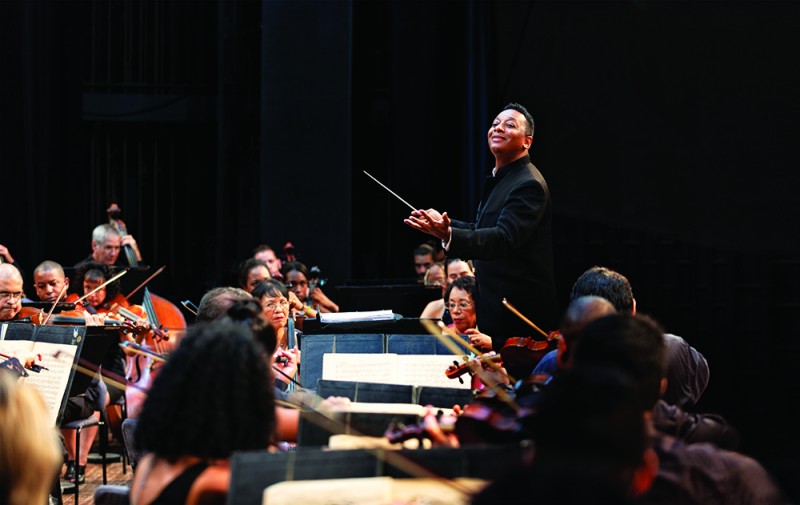
Marlon Daniel, photo by Bob Estremera
When did the music of Joseph Bologne first enter your life?
Marlon Daniel: I first discovered the life and music of Joseph Bologne, Chevalier de Saint-Georges, in the late 1990s, while I was a student at the Manhattan School of Music. This was the first time I had ever heard of a Black composer having influenced Mozart. My first reaction was disbelief, followed by anger, which led to a deep curiosity. How, after devoting most of my life to music, had I not heard of such an influential and important musical figure? Why was it hidden? I somehow felt cheated.
You have devoted more than two decades to scholarly research on Bologne. Why is his music important to you personally?
MD: Representation is important! Maybe if more young people of colour knew about Chevalier de Saint-Georges, his incredible life and music, there would be more musicians of colour in the classical music world today.
I grew up rarely reading about or seeing people who looked like me on the concert stages. Though I had talent and training, I experienced a lack of opportunity. Knowing of Joseph Bologne at this early developmental stage would have been immensely inspirational and would have meant so much to me as an aspiring musician of colour. The world of classical music is very white and male-centric, even today.
The misnomer “Le Mozart Noir” (The Black Mozart) has been applied to Bologne by many, including Tafelmusik. How can orchestras help reframe the role of Black composers in the history of Western music?
MD: By performing works by composers of colour, acknowledging their contributions, and giving them historical significance. When I hear Bologne referred to as Le Mozart Noir, I understand the desire to contextualize his existence, but it in fact diminishes the accomplishments of an innovative composer who influenced some of the greatest composers of the 18th century, including Wolfgang Amadeus Mozart.
France at that time was a centre of the European art and music world, and Saint-Georges was at the forefront of many stylistic innovations. He was a leading figure in French classical music. That alone is a great achievement worthy of any music history book.
Marlon Daniel with Orquesta Sinfónica Nacional de Cuba (National Symphony Orchestra of Cuba). Photo: Adrian Fuentes
“Maybe if more young people of colour knew about Chevalier de Saint-Georges, his incredible life and music, there would be more musicians of colour in the classical music world today.” —Marlon Daniel
Thanks to music streaming platforms and the digitization of the music industry, there is huge potential to reach a new generation of listeners and a large audience. How does increased accessibility to Bologne’s music help turn the dial on this conversation?
MD: There’s no denying that digital media, such as the internet, mobile phones, streaming sites, and social media, all make resources and accessibility of information on Chevalier de Saint-Georges more far-reaching and ubiquitous. With that, however, can come misinformation and sometimes misaligned intent. The misnomer of “The Black Mozart” is a good example of this. We need to be careful with the information that we post and the way in which we present it, so that alongside accessibility to all the new-found research, we are socially and historically conscientious of bias. To that end, I am actively engaging in online seminars and workshops with musical and academic scholars on Saint-Georges.
As artistic and music director of the Festival International de Musique Saint-Georges, you have created one of the most prestigious classical music festivals in the Caribbean. Why is it important to host the festival in Guadeloupe?
MD: It is significant that the festival is held in Guadeloupe because it is the homeland of Joseph Bologne. To this day, his descendants live there and the remnants of the family’s business, the Distillerie Rhum Bologne, are there too. It is also important to the people living in Guadeloupe to know that a great historical figure was born on their island. They have a great sense of pride knowing that, out of the oppressive and unjust time of slavery in the 18th century, one of their own became an incredibly accomplished man in Europe as well as a hero who fought against racial injustices and for those who could not fight for themselves.
How do you view your work as a mentor and educator, and how have your own role models shaped the way you relate to younger students and musicians?
MD: Education is hugely important to me, and my musical education has been one of the saving graces in my life, especially the handful of mentors who have supported me. I want the same for the next gener-ation of diverse artists, and it is important that our education system is free of systemic barriers, such as lack of representation, rather than continuing to reinforce them.
My career as a conductor is still growing, and my international performance obligations mean I can mentor only a few young students. However, as a Black classical musician, I believe it is my obligation to educate other musicians, students, and the general public about the rich history and music of composers of colour. In addition to being on the faculty at Fordham University, I am a frequent lecturer at organizations, and schools, including Columbia and Yale Universities. And unwittingly, I have become the heir to one of my mentors, the noted African American music scholar and Bologne expert Dominique-René de Lerma.
The Music of Joseph Bologne will be re-released by Tafelmusik Media on June 18, 2021. Sign up for our email newsletter to receive updates, as well as for further reading on Joseph Bologne, Chevalier de Saint-Georges.

